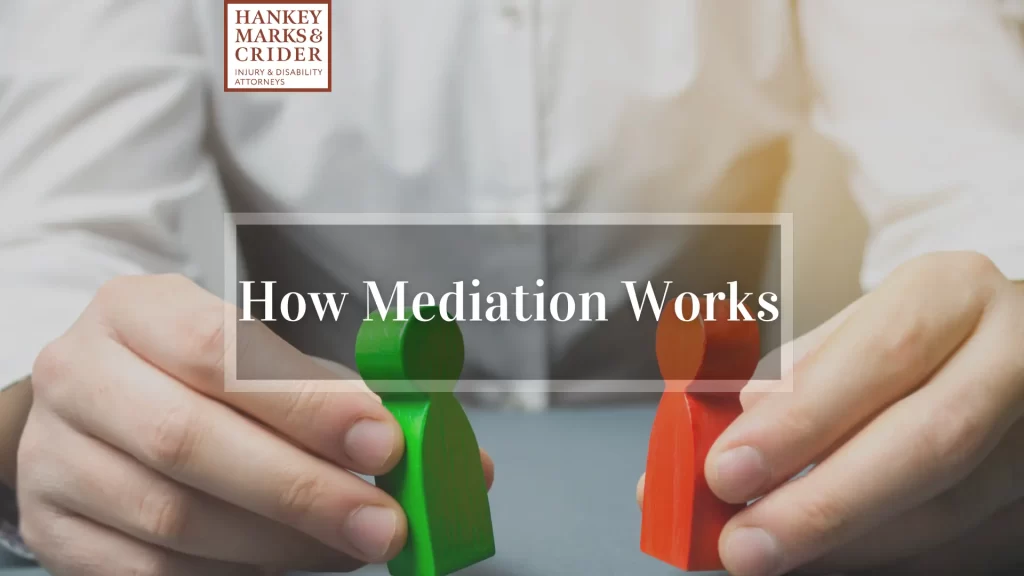
Many people think filing a lawsuit can be an unnerving, stressful process. One significant reason is that no one wants to appear in court, which is open to the public. There is also a lot at stake, and resolving a lawsuit can take some time. How mediation works as an alternative to court is that it allows you to work out a settlement with the defendant and their lawyers.
However, most civil lawsuits are settled without going to trial. If you have a legal claim for anything ranging from a long-term disability to a personal injury, you might be able to resolve it through alternative dispute resolution (“ADR”). ADR includes mediation, arbitration, and other out-of-court methods for resolving legal claims in lawsuits without going to trial.
How mediation works is that it allows parties to participate more actively in resolving disputes. Mediation provides a more informal legal setting than a traditional courtroom. Parties can more quickly and privately handle their disputes using mediation.
How Mediation Works in a Lawsuit
Mediation is a confidential process where a person known as a mediator, selected by the parties or appointed by the court, assists the parties in reaching a mutually acceptable agreement.
Mediation is less formal than litigation in a civil court. Unlike most trials before a judge and jury, mediation sessions are not open to the public. Also, different rules apply to mediation proceedings than courtroom proceedings. For example, the rules of evidence, except those for privileged communications, do not apply to mediation. These rules also encourage parties to limit discovery to only developing information necessary to facilitate the mediation.
Indiana rules applicable to mediation require that parties and their representatives mediate in good faith. However, these rules do not compel parties to reach an agreement and anticipate that an agreement may only resolve some disputed issues. As a result, mediation is helpful if it can reduce points of contention between the parties.
What Happens During Mediation
To facilitate the settlement of a dispute, Indiana requires the presence of all parties and their attorneys or other representatives with settlement authority at each mediation conference. These conferences allow the parties to explore ways to resolve their dispute.
At the beginning of the mediation, the mediator must inform the parties that they cannot provide legal advice and do not represent either party. A mediator must recommend that the parties seek or consult legal counsel.
During the mediation process, the mediator:
- Helps the parties identify the issues
- Reduces misunderstanding
- Clarifies priorities
- Explores areas of compromise, points of agreement, and legitimate points of disagreement
After making any opening statements, the parties engage in joint discussions. Each party will then meet privately with and without the mediator. A mediator can meet jointly or separately with the parties and provide a case evaluation. A mediator must advise the parties that this evaluation is not legal advice.
The mediator cannot give an opinion on how a court would apply the law in the case or the outcome if the case goes to a formal trial. A mediator may not advise any party on what to do in the case or whether to accept an offer.
A mediator does not make any final decision at the close of mediation. The parties must reach an autonomous decision independently. If the parties agree on some or all of the issues, they must put this agreement in writing.
Once the agreement is complete, if mediation is court-ordered, a judge must approve the written, signed agreement. This approval has the same force and effect as a judge’s order. Since the approved agreement creates binding rights and responsibilities, it has the same legal effect as a contract between the parties.
How Long Does Mediation Take
 The length of the mediation process typically depends on the complexity of the dispute and the number of issues involved. While each case is unique and may present different challenges, mediation rarely takes longer than litigation.
The length of the mediation process typically depends on the complexity of the dispute and the number of issues involved. While each case is unique and may present different challenges, mediation rarely takes longer than litigation.
Parties can often resolve a civil or administrative dispute in as little as one day. Other parties, such as divorcing couples, may require numerous mediation sessions.
Absent an agreement by the parties, the court determines how the parties divide the costs of each mediation session. Generally, the parties must pay their mediation costs within thirty (30) days of the close of each mediation session.
Contact Hankey Marks & Crider
Filing a lawsuit is often a stressful, daunting process. As a form of alternative dispute resolution, mediation offers litigants the chance to settle their legal disputes and bypass the formal, public process of a courtroom trial. The lawyers at Hankey Marks & Crider can help you find legal solutions through mediation and other forms of alternative dispute resolution. Call (317) 634-8565 or use our online contact form to arrange a free consultation.
Related posts
What Happens After My Lawyer Sends a Demand Letter?
How to File a Personal Injury Lawsuit
Do I Need a Personal Injury Attorney?

